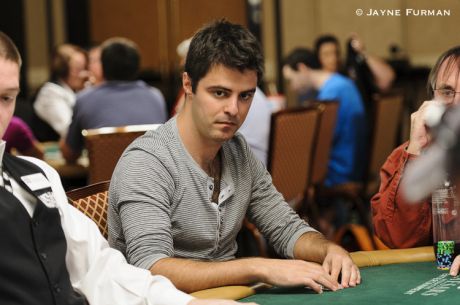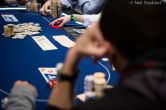��Gut Feelings�� in Poker -- What Do They Mean?

You often hear people explain some decision they made with words like, ��I just had a gut feeling about it.�� This is as true in poker as in all other kinds of decision-making.
I would like to suggest to you that this is not merely a figure of speech, but that the saying is more literal than we tend to assume.
Your Body and Your Mind
About 15 years ago, I attended one of the most interesting lectures I��ve ever heard. A doctor at the University of Minnesota described the research they were doing into eating disorders.
The vagus nerve is the main neural trunk connecting the brain and the internal organs of the chest and abdomen, and other scientists had discovered that implanting an electrical stimulator on the vagus nerve was effective at treating depression. The Minnesota team was exploring the theory that patients with bulimia, without being consciously aware of it, were self-treating depression by their purging �� an act that intensely stimulates the vagus nerve and, by that pathway, the deep brain. Implanting nerve stimulators in these patients effectively quelled the purging, presumably because it replicated the effect they had been getting by self-induced stimulation of that nerve.
Something recently reminded me of this lecture, and prompted me to do a little digging into what has been learned since then. It turns out that electrical stimulation of the vagus nerve has been discovered to be an effective treatment in a variety of disorders, including depression, anxiety, post-traumatic stress disorder, anorexia, obesity, dementia, and schizophrenia.
But of course, the neural connection runs both directions. Long before researchers discovered that you could affect the brain by stimulating the vagus nerve, it was known that that nerve is the primary means by which the brain controls things like heart rate, stomach acid production, and speed of intestinal activity. In recent years, it has also been found, surprisingly, that important parts of the immune system are modulated by the brain via the vagus nerve. Early research is showing promise at stimulating the vagus nerve to treat such immune-related diseases as rheumatoid arthritis, asthma, diabetes, and inflammatory bowel disease.
All of which is a long way of emphasizing this point �� the mind and the internal organs have deep, complex, important neurological connections that science is only now beginning to understand.
Ever Felt a ��Gut Punch�� at the Tables?
So let��s get back to that ��gut feeling�� thing. Is it real? I sure think so. Not in the sense that one��s intestinal tract is doing the decision-making, but in the sense that it often reflects the state of the deepest levels of one��s brain.
As you probably know if you��ve ever handled a wild animal, defecation is one of their most frequent reactions to stress. Humans are no different, as any number of soldiers returning from a harrowing battle can report. Even less intense anxiety-provoking situations, such as a crucial presentation to the boss, a piano recital, or a first date, can trigger gastrointestinal distress. This reality is manifested in common descriptive expressions like ��gut-wrenching�� and ��stomach-churning.��
I, for one, have never experienced a visceral sensation when playing poker. (That��s a particularly apt word in this context �� the viscera are the internal organs of the abdomen.) But I do feel such things in other situations, particular with episodes of social rejection and personal insults. To me these things actually feel, as the saying has it, like being punched in the gut.
In my first few years of playing poker, I was keenly aware of the strange phenomenon of hearing a voice in my head from time to time. Specifically, it would pop up when I felt like I might be in a bad situation in a hand. The voice said only one thing, but it was almost frighteningly insistent: ��Get out! Get out! Get out!�� As you might imagine, I would fold when this happened.
As I gained more poker experience, this voice gradually went away. It��s been many years now since I heard it. Looking back, it��s not hard to sketch a general picture of what was happening. Through some combination of inputs, a deep level of my brain recognized that trouble was brewing �� and recognized it more acutely than my conscious mind did. This provoked anxiety. My internal voice was the embodiment of my anxiety.
But as I gained experience, I became less emotionally affected by the game. Simultaneously, I improved my ability to analyze what was happening at the poker table, so that I was processing the relevant information in a more conscious, cerebral way.
Early on, I probably had a sort of general sense of whether an opponent��s body language was projecting strength or weakness. With more experience, however, I was able to make specific observations and correlate them with a mental database of their likely meanings �� things like the way hands tremble from confidence and anticipation of winning. Or leaning aggressively forward and forcefully placing chips in the pot reveal the false bravado of a bluff.
I was therefore better able to arrive at a rational decision, and I became less reliant on subconscious and emotional processing. Hence, less anxiety, and less occasion for that voice to shout its warning.
Feeling Anxious in a Hand? You��re Supposed to Feel That Way
In retrospect, I find it kind of surprising that I did not notice a tightening of my gut in those spots. It��s a perfectly natural and extremely common way that people experience anxiety �� and anxiety is a perfectly natural and extremely common emotion at the poker table.
Think of how often you��ve heard players after a hand say things like, ��I was worried you were going to call,�� ��I was scared he had the flush,�� or ��I was afraid that somebody had a higher straight.�� With all that worry, fear, and anxiety going on, there��s probably a lot of churning stomachs and wrenching guts in those seats, too.
So what��s the take-home lesson from all of this? Know that your internal organs are in fact hard-wired to be in constant, two-way communication with your brain at a subconscious level. If you are not already in the habit of doing so, it might be to your advantage to start paying attention to sensations that you feel in your chest and abdomen when faced with a difficult poker decision.
Again, this is not because the viscera themselves are doing any thinking, but because they are sensitive gauges of your mind��s workings at a level that you may not be able to access directly. Your brain��s subconscious processing may well be picking up on and reacting to key pieces of information that you have not consciously perceived, and the only way you can get at the conclusions it has drawn is by paying attention to what your gut is telling you �� literally.
One last thought...
I believe the mind-body connection described here is important enough that we should all get together and sign a petition to the powers that be in the field of anatomical sciences, requesting that the vagus nerve be renamed the Vegas nerve.
Robert Woolley lives in Asheville, NC. He spent several years in Las Vegas and chronicled his life in poker on the ��Poker Grump�� blog.
Want to stay atop all the latest in the poker world? If so, make sure to get PokerNews updates on your social media outlets. Follow us on Twitter and find us on both Facebook and Google+!









